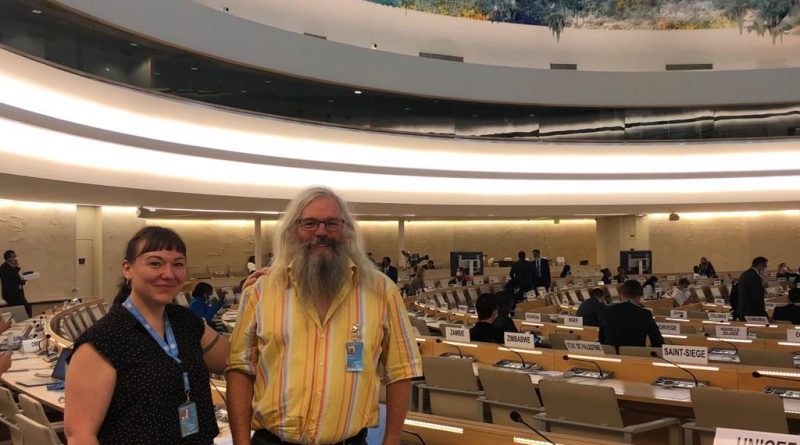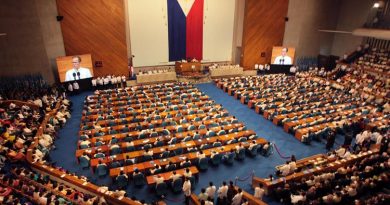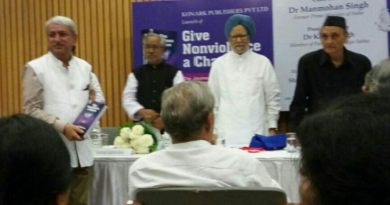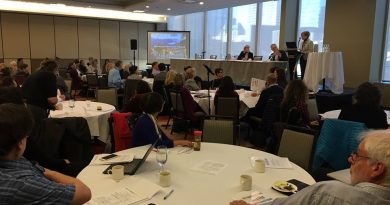Deepening the thrive for life and a good life: CGNK at the 50th Session of the Human Rights Council
At the core of our existence, radiating itself within and without: life!
Life is primal, at the root of being. So is the nonkilling principle at the root, at the foundation of all ethics. Further, life is always present when dignity is fulfilled. In life, whoever looks for it will find the beauty and the good of life. So forth, one will find joyful and sound means to share and express life, in happiness, efficiency and gratitude.
A fulfilled life is a peaceful life. Now more than ever, it is time to enhance peace and to set it one of the basic values of our human civilization, but also for work for it tirelessly until the culture of peace is stronger than war or violence!
By peaceful, nonviolent and nonkilling means life can be preserved, harm prevented and said positively, by these personal and societal empowering means, we give effective worth and value, quality to the lives we lead, individually, together and universally.
50th session of the Human Rights Council (June 13th – July 8th)
The Human Rights Council gives us a modest opportunity to stand for and highlight the central value of life, to recall it if needed. It is also an accurate forum to show the importance of peace, as self-standing value, but also as an essential one to see life blossom, in happiness for all.
For the first time at this 50th anniversary session of the Council, dear supporters of CGNK you had two representatives in Geneva, city of peace. We are thankful to the participation of the Swedish-Ostrobothnian Foundation (Svensk-Österbottniska Samfundet) who made it possible for Elina Viitasaari from Finland, CGNK’s gender focal point, to join Christophe Barbey, our main representative in Geneva, thus doubling the work we could do, the issues we could address.
The work of the Human Rights Council (HRC) revolves around various mechanisms, all meant to step by step improve the situation of human rights and people worldwide. Results are tangible. Though it is an intergovernmental body where States are represented by their executive authorities, States with their divisions and idiosyncrasies, their petty or serious fights too often endangering life and doing a lot of boasting and lip service, Non-Governmental Organizations (NGO’s) have their say therein, one of the best speaking spaces for NGOs in the UN system. Through soft and sometimes hard law, cultural progress and various forms of dialogue, it is a space we use to the best of our abilities to improve the human condition and respect for life, a good quality of life for all.
At each session, the Council adopts numerous resolutions. Some are discussed yearly, others come at regular times over the years, or whenever needed. After at least one mandatory informal meeting open to all, though usually there are more, resolutions are often adopted by consensus, no State Member of the Council demanding the vote. For this 50th session, 23 resolutions were adopted and only 6 were voted.
CGNK participated in the negotiations of two resolutions: discrimination against women and girls, and casualty reporting. We also observed the negotiations of three more, violence against women, female genital mutilations and the effect of climate change for human rights. All of them were adopted by consensus.
Negotiations regarding discrimination against women and girls were intense. The right to adequate education, to sexual and reproductive rights, and to participation of public life and political activism were under a constant debate. Elina Viitasaari brought up to discussion the importance of embracing these rights as an effective tool for combatting sexual and gender-based violence. Regarding the human rights and climate change, Elina was concerned of the resolution draft missing paragraphs about the link between climate change and violence against women and suggested it to be included both in the resolution and in the implementation. Unfortunately, this addition never made it to the final resolution, leaving the focus of the effects of climate change mostly on food security and agriculture related issues.
Though a very sad issue, casualty recording as well as good reporting systems are essential for the preservation of life and respect for the right to life. It is vital for prevention to known that all lives will be accounted for and proper reporting will serve to garner more precise data on casualties and how they happened, thus improving accountability. Some States argued that this was Humanitarian law only, not human rights or a peace and security issue thus falling only in the realm and functions of the Security Council; arguments that sadly we too often hear when human rights and peace are linked. However, none of these States were either Members of the Council or dared to call for a vote, so the Office of the High Commissioner for Human Rights can continue using the framework it developed for casualty reporting, now with a clear and consensual mandate. During the negotiations, your representative recalled the symbolic importance of birth registration, SDG 16.9, as to be accounted for as a casualty, having a legal identity needs to be concurring. We also recalled the importance of casualty reporting to diminish the occurrences of enforced disappearances.
At each session, the Council addresses issues of importance regarding situations in the field either through debates, resolutions or both. We delivered two statements on the situation in Ukraine. In the first one, we made an outcry for the right to peace and for reopening the discussions about it, highlighting that fundamental human rights come along with fundamental human methods; war is certainly not one of these methods complying with human rights. Thus, we joined many voices calling to stop the war, all wars. In the second debate, Elina Viitaasari made a vivid call to end the use of sexual violence as a weapon of war, and to stop the war through women’s bodies.
A special meeting was called to address the situation of women and girls in Afghanistan, and a resolution was adopted. Elina made a statement recalling the importance of Security Council resolution 1325 on women, peace and security, including in the Afghan context, but she also asked, very simply, to the de facto government of Afghanistan and to Afghan men to respect women and girls, and if need be to be taught to do so.
CGNK also follows the situations in Eritrea and Ethiopia. We made statements for both, highlighting the importance of proper and humane leadership and the availability of numerous peace tools, that we listed, to prevent and solve conflicts, to build inclusive and peaceful societies.
As usual, we made comments at the adoptions of Universal Periodic Reviews, this time for Haiti, Iceland, Lithuania and Timor-Leste. For Haiti, in a statement delivered in French, we congratulated the Government for its intention to ratify the protocol on the abolition of the death penalty, an issue we will follow closely. We also encouraged the Government, as it reinforces its institutions, to design and include therein, under the rule of law, more participative and democratic procedures. For Iceland, we asked during the approval, questions for which we will be interacting with the delegation again to get answers, as they did not directly reply during the adoption of the UPR. We have questions regarding the training of professionals about domestic and gender-based violence; about the implementation of the new regulation on rape stating that only a “yes” is a consent and on the process of ratification of the Enforced Disappearances convention, which the Government of Iceland has considered doing since 2011 and pledged to do in 2019. For Lithuania, we did a joint Statement with Conscience and Peace Tax International (CPTI) on the reinstatement of a conscription for soldiers and on the poor condition of conscientious objectors thereafter. (CPTI is an organization we often work with that works for conscientious objectors, including those objecting to pay for war and that raises awareness about the need for more money for peace creating).
During the session, NGO’s also had the opportunity to speak with two United Nations High Officials. First, we met with Abdulla Sahid, President of the General Assembly. We asked for news on the Financing peace process at the General Assembly, the purpose of which is to have all States directly financing some of the peace activities of the United Nations through the regular UN budget. So far, most peace operations are financed through extrabudgetary funding, thus some States never pay for peace. The President of the GA had good hope of success for the motion, the final decision due for September.
We also met Volker Türk, responsible at the UN for policy. In recent years, the UN has focused a lot more on universal issues, thus designing specific policies, such as the Sustainable Development Goals, Our Common Agenda or the Call to Action for Human Rights. Weighing the importance and the accuracy, but also the potency of these policies with one of their authors was an essential moment during the session.
- All resolutions adopted by the Council are here.
- Casualty recording is resolution 50/11.
- Ending discrimination against women and girls is 50/18.
- The OHCHR guidance on casualty recording is here.
- All our statements will be available here.
42nd Working Group of the Universal Periodic Review
The Universal Periodic Review brings all Member States of the United Nations, every four years and a half in front of the Human Rights Council, for a peer to peer review of their human rights situation. The review is based on three reports; one by the State under review, one by the United Nations (the office of the high commissioner) and a compilation of NGOs and other stakeholders’ reports. Three sessions of 14 States are held yearly, during which States make recommendations that the concerned State can either accept or note. The Council then adopts a final report.
Since 2015, CGNK has been making reports at every session on the rights to life, to peace and demanding the urgent ratification of the Convention of the prevention and the punishment of the crime of genocide. To have more space in our reports to address specific issues, we have started writing two annexes to our reports: one on “nonkilling and law, some aspects of the right to life” and one on “comprehensive peace policies”.
This time we made submissions for Japan, South Korea and Switzerland. With more means, we could do more extensive reports, on more nonkilling aspects of life for more countries.
For Japan, which will stand as a member of the Security Council during its UPR process, we urgently call for the ratification of the genocide convention. Japan is, population wise, the second biggest country in need of ratifying the convention. We also strongly demand the abolition of the death penalty, a shame against humanism and modernity. We also call for the establishment within the right to life of a right to longevity. Japan has made longevity a priority in its Voluntary National Report for the Sustainable development goals, as. Making it a right will be one the possible concrete actions fulfilling this commitment. Japan also has the ambition of becoming (quote): “a society in which no one is driven to suicide”. A position we laud, though calling for more effective measures to achieve it. Similarly, homicide and road traffic casualties, though the rates are low, still need more prevention efforts. We then addressed various aspects of the peace constitution, for which Japan has a great head (and heart?) start but can still mightily progress. Peace education, enhancing peoples’ participation and their right to peace, peace zones, setting up a peace ministry and universal peaceful settlement of disputes are some of the tools and possibilities needed for peace to progress.
For South Korea, we did a short submission calling for the abolition of the death penalty, for the ratification of the Convention on enforced disappearances and – our usual demand –for holding the Korean peninsula peace conference that was legally required for by the 1953 armistice agreement and supposedly to happen within three months it. It is still awaited for.
For Switzerland, we made a vivid call to end poverty, recalling that poverty kills. In a gentle outrage, we highlighted the fact that Switzerland, though one of the richest countries in the world, if not the richest does so little to help the 15% of its population living below the poverty line, or at risk of becoming poor. Indeed, many more people and countries in the world are in much worse situations, but surely Switzerland, as it can and should, shall be part of the good example not of the problem. A universal basic income could be one of the solutions. We also called for more financing of peace, including for persons (like your delegate) who refuse to pay for military taxation, preferring to see their taxes going to a peace fund.
The Universal Periodic Review is a very good procedure. Though to progress faster, it shall go deeper into the needs and problems of the people, may be with the help of more persons focusing more persistently, on more issues, yet keeping in sight the broad need for a better and sustainable future for all.
- All our submissions are or will be uploaded here.
After doing it for seven years, we are undergoing some changes to do our work better, the annexes the UPR and more centered focuses. However, to do this work well, we need more time, help and funds. Thank you for your active participations, giving life to life and progressing together towards a nonkilling world.
Christophe Barbey,
16th of August 2022




